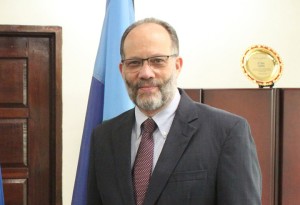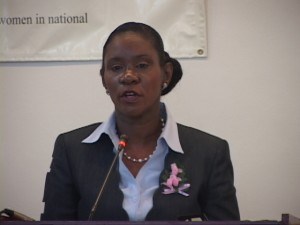Happy International Women's Day 2002 to the women of the Caribbean Community.
One of the major issues which arose during the war in Afghanistan was the plight of the women of that country. Their sisters in the Caribbean Community, as well as the men, were astonished and distressed by the details of the hardship and discrimination suffered by the Afghan women, in particular the denial of their right to education and employment. In the Caribbean, where women not only have access to education but have used that access to excel and indeed surpass the performance of men at many levels of the education system, there is understandably a temptation to be complacent with respect to the issues which should be of concern to Caribbean Women.
In this context it is relevant to note with concern the ease with which the Afghan women were stripped of their rights and freedoms, and the relative silence on this issue in the global community until the outbreak of the current war in that country.
As the world continues to exist in a state of uncertainty following the horrific events of September 11, 2001, and as we battle to avoid severe economic recession on a global scale, with its resultant repercussions on the economies of the region, I want to use this opportunity to emphasize the importance of the 'caring' work that is done overwhelmingly by women both within and outside of the home, and to urge Member States to take appropriate action to give greater recognition and value to this work.
CARICOM governments have agreed, at regional and international levels, to take action in relation to a particular aspect of this 'caring' work namely the unwaged work in the home and community. The recommended action calls for measuring and valuing this unwaged work and including it in the national accounts. Our ability to translate these agreements into reality would be a tangible demonstration of our thanks and appreciation due to the women of the region.
For the Member States of CARICOM, the rapid spread of HIV/AIDS among our women, in a region having not only the second highest rate of incidence of the disease globally but also the second highest rate of female infection in the world (35 per cent), after sub-Saharan Africa (55 percent); the continuous and almost endemic acts of domestic and other forms of violence against women; and the continued under-representation of women at the highest levels of decision-making; remain specific areas of concern that require action to reverse these trends. Generally the unequal treatment meted out to women, in comparison with men remain a feature of our society which yearns for correction.
At the level of the Secretariat, we successfully hosted in October 2001 a Ministerial Policy Roundtable on Gender and Development at which Ministers accepted a framework for mainstreaming gender into key programme areas of the Community.
The framework, which was subsequently endorsed by the Council for Human and Social Development, included among its policy and programme options, an improvement in the conditions of service and opportunities for mobility in the teaching and nursing professions. It was felt that such action in sectors where women predominate would contribute to re-valuing and raising the status of these 'caring' professions.
Finally, I am pleased to announce the winner of the Seventh CARICOM Triennial Award for Women. She is Professor Rhoda Reddock, head of the Centre for Gender and Development Studies at the St Augustine Campus of the University of the West Indies. Professor Reddock who recently earned the 2001 UWI's Vice-Chancellor Award for Excellence pioneered the teaching of disciplinary and inter-disciplinary Women's and Gender Studies courses at the UWI. Her extensive research and publications have included areas such as Race, Class and Gender in the Caribbean, Women and Labour in Trinidad and Tobago and Ethnicity, Class and Gender in Trinidad and Tobago.
Her research work has provided an extensive resource base for students and senior intellectuals alike and has provided our Governments with insightful direction in terms of the integration of gender into the development process.
Congratulations to Professor Reddock and once again Happy International Women's Day to the women of our Community.
March 8, 2002





